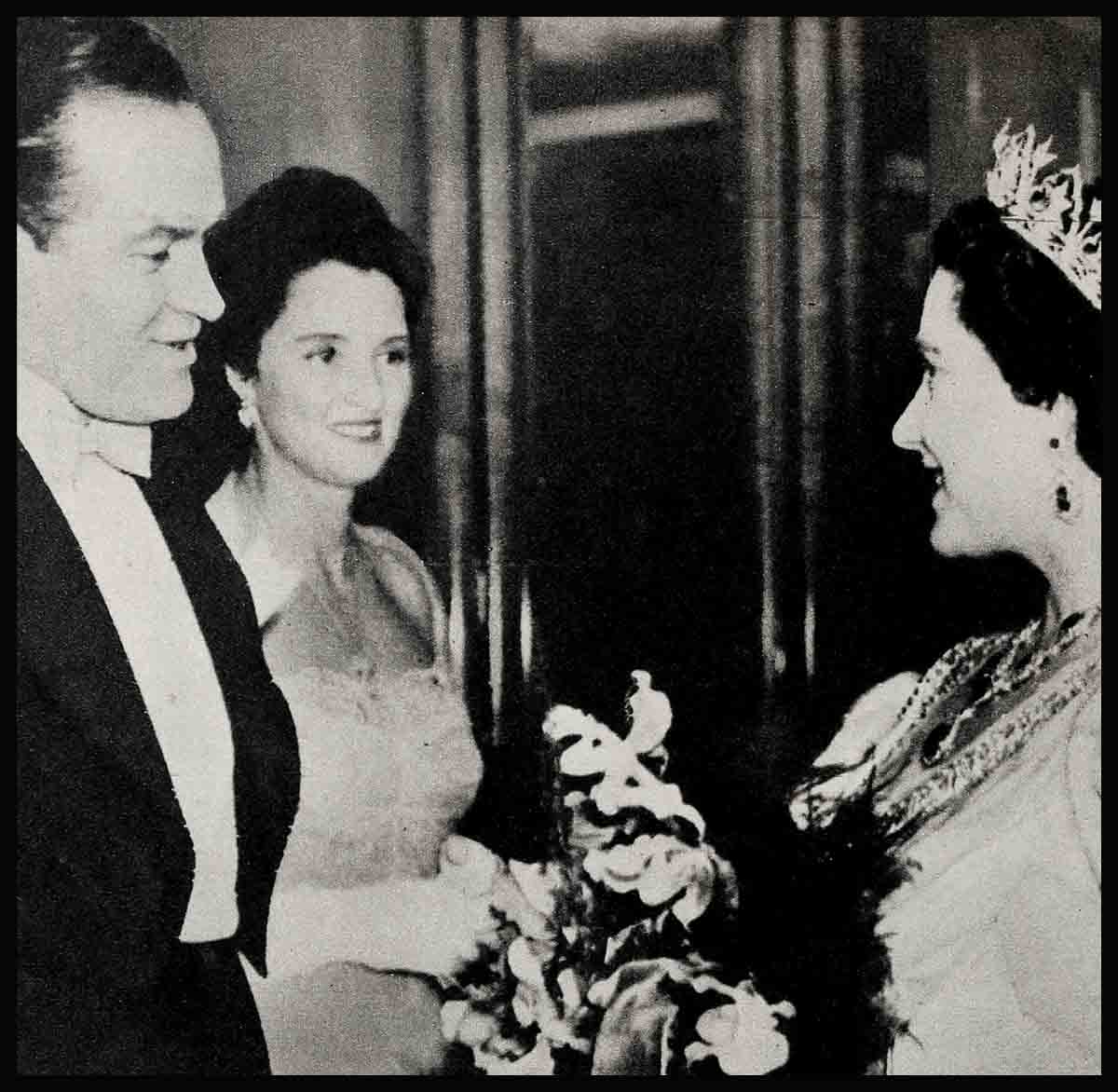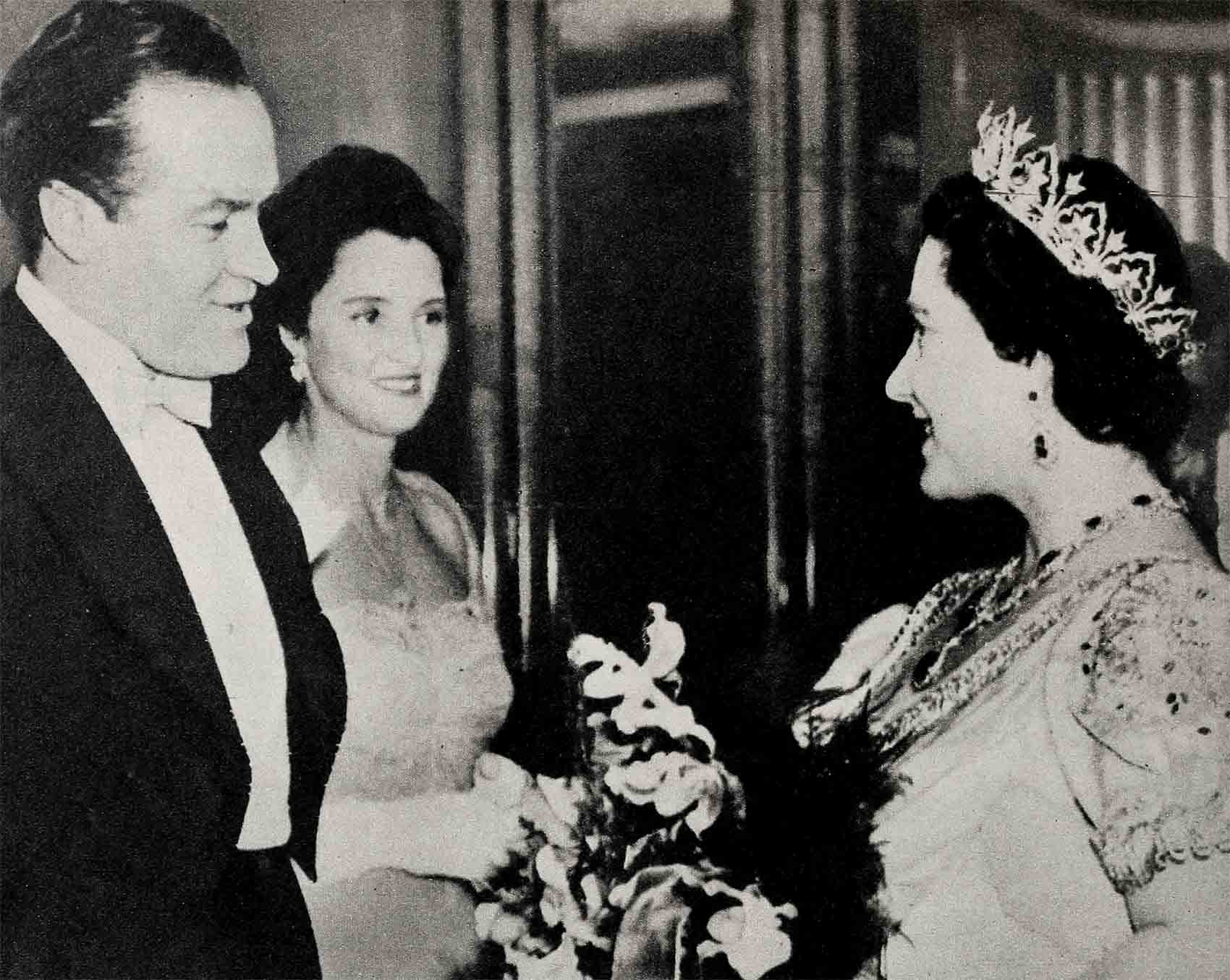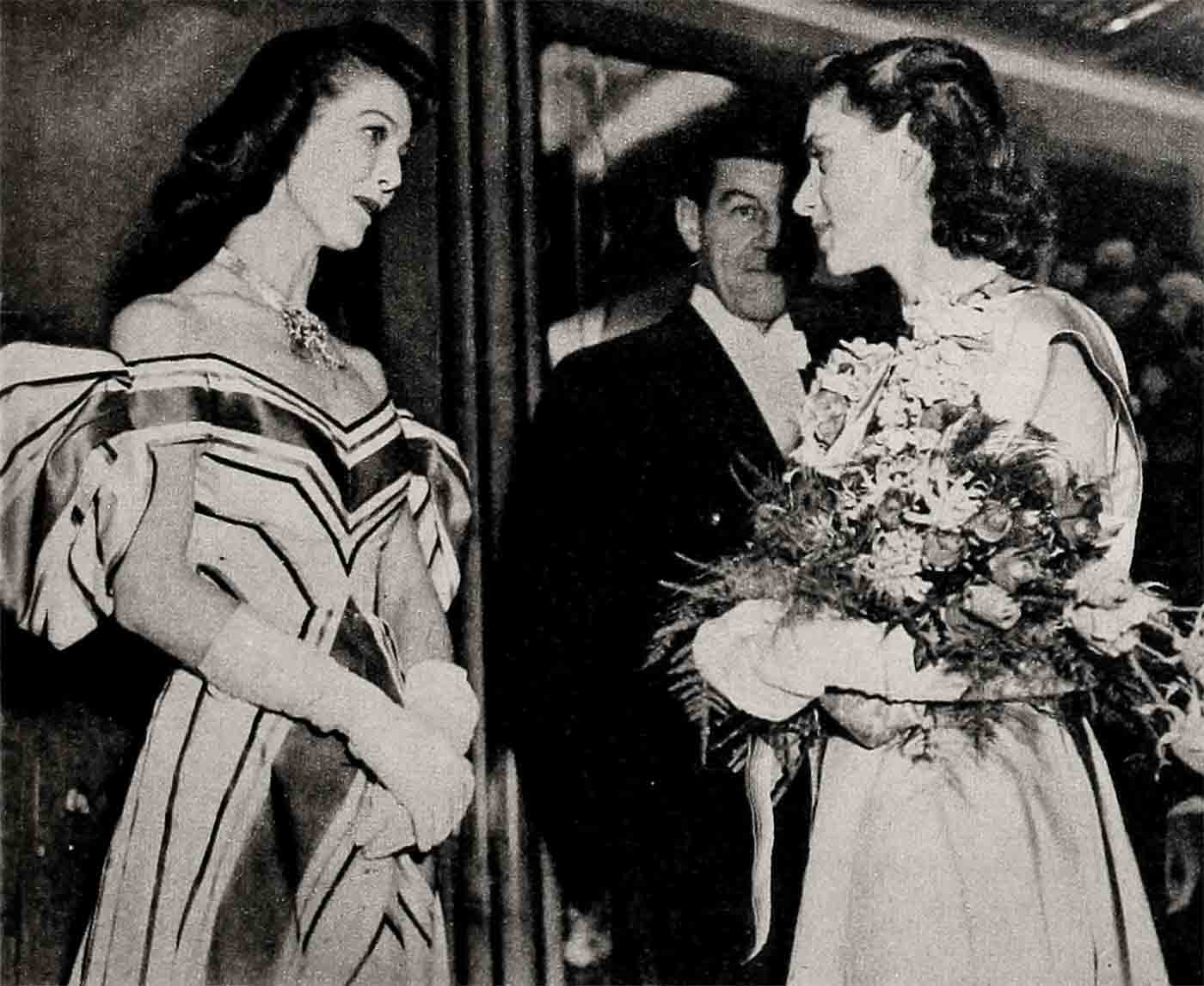
Command Performance
Nov. 10: Oh to be in England, now that November’s here. Well, here ah is, in London again, honey, after almost six years. How I love it. It may be a drear, cold, grey land of austerity to some, but it is sheer heaven to me to be again in this gallant, scarred old city I love so much. And no black-out. The black-out was unadulterated terror to me in winter, 1941-42. I had forgotten how London looked with lights on. It looks wonderful. The country-side was still green, and the trees as colorful as those in Westchester county, as we rolled up to London in the boat train this morning. The way in which the English have tidied up is miraculous. Even at Southampton, where there was such terrible bomb damage, they’ve done a wonderful job of getting rubble out of sight. When I got into the cab at Waterloo Station, I made the driver go first to Parliament Square to visit Abraham Lincoln on his pedestal, and then to Trafalgar Square, to pay respects to Admiral Nelson, still high on a column overlooking the city. Having made my calls on these two, I went off to the Savoy Hotel. They say all good Americans go to Paris when they die; rest of us go to Savoy.
P.S. Oh, yes, town’s getting ready for wedding.
Nov. 11: Ran in to see Cobina Wright today. She was in the middle of entertaining Bea Lillie and the Marquess of Milford-Haven. The Marquess has been deputized by Cobina’s old friend, Lt. Philip Mountbatten, who is party of the second part, in this royal wedding to look after Cobina. Nice work for both. Kinda cute kid, the Marquess.
Nov, 12: Lawsy me, all hell has broken loose. Two nasty London newspapers—the cads!—have revealed the most closely guarded secret in England. They have betrayed the design of Princess Elizabeth’s wedding gown. One old meanie published sketches of the dress; the second printed a brief account of its magnificence. I hear Buckingham Palace is in a royal swivet. Their Majesties are angry. The princess is in tears, but the secret is out. What I wonder is how on earth any girl can move, or carry off a wedding gown of such regal magnificence, embroidered with such a tremendous weight of seed pearls and crystal. It must weigh a short ton. The princess need have no fears the dress will be copied. It is indeed a gown only for a future queen. Who else can afford 8,000 bucks for a wedding dress? Yes, the secret is out, but it’s safe.
Nov. 13: To Buckingham Palace this morning to pay my respects, but not to Their Majesties. I saw them crowned in Westminster in 1937, and traveled for six weeks with them through Canada and America in 1939, but that does not constitute formal introduction in England. So I went to the working, or overall, side of the palace. This is comparable to the executive wing of the White House. If The bobby on guard at the palace gates casually beckoned the taxi into the palace yard. It had been almost six years since I was last in Buckingham. The only difference I can see is that it is just six years shabbier. Heaven knows it was worn and shabby in 1941-42, but the red carpets are a lot thinner today, and the rose brocade on the little French chairs in the anteroom is reduced to a handful of threads. The stuffing of chairs is even beginning to leak out. Tsk, tsk—things are tough all over. I paid my respects to Their Majesties’ press secretaries, and left, wishing to high heaven some good old American huckster was in charge of the press arrangements. A press agent who speaks with a broad “A” is a very upsetting experience to one who has always voted a straight democratic ticket.
Nov. 14: Dear Diary, I was too excited last night to finish my daily stint. I was joining a new fan club. It is the Princess Elizabeth club. I went to a charity ball which she attended last night. I think she is one of the prettiest girls I have ever seen. Her coloring is out of this world. From her mother, she inherited porcelain skin, her peaches and cream complexion. Like Her Majesty, her hair is so dark brown it’s almost black. Yet for all her poise, she has the defenseless look of all the young who must yet face hard experiences of life that spare neither royalty nor rabble. Her beau did not come. Lieut. Mountbatten dined with his uncle and aunt, Earl and Countess Mountbatten of Burma, who had just arrived via plane from India. Princess Elizabeth looked beautiful in a lovely frock of stiff white brocade. The skirt vas full, the bodice fitted, and outlined across the shoulders with a fichu cf the same material. No tiara, just a string of pearls, and two teensy weensy diamond bracelets. Hardly enough glitter to get a girl into El Morocco.

enter prince charming . . .
Nov. 15: Lucky, lucky me. Lt. Philip Mountbatten almost trapped me in a revolving door today. At first, all I could see was a big blond boy rushing like mad to get out of the Savoy. I jumped aside to avoid collision, and glared, until I recognized the bridegroom. Heavenly day! Then I just stood and gaped and wished I’d worn my bobby sox, so I could scream and swoon. A dream boat—that’s what he is. Darn it!—work’s interfering with pleasure. Had to refuse Lady Nancy Astor’s week-end invitation to Cliveden. Last time I spent a week-end at Cliveden, Pearl Harbor happened. She guaranteed no catastrophe this week-end, but I don’t dare leave town with such a big story as the wedding on the fire.
Nov. 16: The wedding week, and everyone getting more and more excited about it. Life is damn austere and hard in England. People are looking forward to Thursday as temporary relief from the hard monotony that is the lot of Englishmen today. But what a contrast is this royal wedding to the coronation! Then I went out every night to half a dozen great dinners, balls and receptions. Today such entertainment is impossible in England. It is all one’s friends can do to scrape up a meal for a few guests semi-occasionally. There is to be a little dance tomorrow night at the Palace for the Princess and a few of her young friends. Then, on Tuesday night, there is to be the only great function in connection with the wedding—a reception for all the visiting royal firemen, at Buckingham. Even the wedding breakfast on Thursday is limited to 100 guests. It is against the law in England for more than 100 persons to eat at a private or public dinner.
Nov. 17: Luck of the Irish holds. I drew the No. 2 press seat in the abbey, when seats for the American press were drawn this morning. Glory be. Even the first formal display of the royal wedding gifts at St. James Palace this afternoon takes second place to that No. 2 seat. But presents! Holy smoke, if worse comes to worst, they can hock diamonds, gold service and silver plate for a very fat fortune. Four diamond necklaces, four diamond tiaras, a diamond stomacher, diamond rings, diamond bracelets—count ’em, what a haul! Enough silver to stock Sears Roebuck for the next fifty years. Not to mention antimacassars sent by old ladies, an electric dishwasher, an ice-box, a television set, shoe brushes, dozens of pairs of warm wool socks for the bridegroom, and two kitchen aprons for the bride. The presents overflowed four huge rooms in St. James Palace, and they overpowered me.
Nov. 18: This town is full of pickets and princes. All the European royalty still holding down jobs on the same old thrones are here—not to mention a lot of beat-up royalty now at leisure. An honest woman can scarcely push her way into a posh pub like Savoy, or Claridge’s, without asking a royal flush to make way. In fact any social gathering not opened by three kings or better is a bust. Earl and Countess Mountbatten had a swell cocktail party at the Dorchester Hotel this evening. Both handsome as Greek gods.
Nov. 19: Just before the battle, Mother, I am thinking most of you. It’s almost H-hour. His Majesty has just pivoted his future son-in-law to the head of the line. He is no longer plain Lt. Philip Mountbatten, British commoner, but HRH Prince Philip, Duke of Edinburgh, Earl of Merioneth, and Baron Greenwich. Philip is one Greek who made good in London without starting a restaurant. Buckingham Palace is all lit up tonight, and a great many of His Majesty’s loyal subjects have followed suit. I drove up the Mall for a glimpse of the flood-lighted palace, and it is lovely, but the rest of London can scarce scrape up enough bunting to make a handkerchief. The few pitiful decorations attempted make London look more than, ever like a picked chicken. Only on the government offices in White-hall is there any bunting or color.
Nov. 20: It is almost midnight, and between excitement and exhaustion, I have almost knocked myself out. The wedding was wonderful. Next to the coronation, it is the most splendid sight I ever saw. What a beautiful bride! Loveliest I ever saw, and one of the most radiant, too. The new duke was a solemn bridegroom, but only, I think, because so much pomp all but scared the wits out of him. I loved that moment when bride and bridegroom left the sanctuary for the high altar, and King George had to get down on his knees and wrestle with the bride’s train. It caught on the sanctuary steps, and the little pages were no match for it. So down went the King, his ceremonial sword swung aside. He strove manfully with the problem, and won. The whole ceremony was so beautiful, and there were so many little, human incidents proving royalty can be people. Queen Elizabeth didn’t cry, as do most mothers. But old Queen Mary—and what a woman she is!—blew her nose vigorously. If I weren’t tired, I would go up to Buckingham Palace to join the mobs now yelling themselves hoarse. I do hope Jim Farley and the boys in the back room don’t hear about this and disqualify me.

moment of a lifetime . . .
Nov. 25: All my life I have heard about Command Performances, and now I have seen one. This monarchy business isn’t half as bad as William III made it seem. The second Royal Command Film Performance tonight, at the Odeon Theatre in Willie Shakespeare’s Leicester Square drew only a slightly smaller street crowd than the royal wedding. The traffic jam around the theater was so tremendous, ticket holders abandoned their cars blocks from the Odeon, and walked. I had the usual luck of the Irish. I was escorted by a flying wedge. Secretary of State George Marshall was in the vanguard; American Ambassador Lewis Douglas was protecting the rear, and Scotland Yard was on the flanks. It wasn’t intentional.
I just got mixed up in the formation when we all abandoned cars, and the Secretary and the Ambassador hustled me along with their parties. The King and Queen with their guests, Princess Margaret Rose, Queen Ingrid of Denmark, and King Michael of Roumania sat in a beautiful box encircled by a small formal garden of chrysanthemums. Thank goodness America did send an excellent film, “The Bishop’s Wife,” for the event. That, plus the first showing of color films taken of the royal wedding, and the parade of half of Britain’s and America’s film royalty, made a gala evening for people who had gladly paid 100 dollars for a seat.
And what a parade of stars it was. Bob Hope, Robert Montgomery, Ann Todd, David Niven, Carole Landis, Margaret Lockwood, Sir Laurence Olivier, Vivien Leigh, Alexis Smith.
Hope drew the most laughs. He gave the King and Queen an album full of autographed pictures of Hollywood stars, as a wedding present for Princess Elizabeth. When the King, chuckling, asked if Crosby was in the book, Hope nodded solemnly. “Yes, sir,” he said. “He’s put down three crosses. You see, sir, he can’t write.”
The queen laughed so gleefully her diamond tiara was knocked sideways.
But there was a serious note in the show, a speech made by Loretta Young, one of the stars of “The Bishop’s Wife.” She was introduced by David Niven, who was also in the picture, but Niven seemed to be keeping deliberately in the background. The year before, another Niven picture “Stairway to Heaven” had been the Command Performance choice, and it was as though he thought he’d had enough of the glory, and was stepping aside so the others might be seen more easily.
His introduction of Miss Young was brief. “The main topic—Anglo-American relations,” he said, speaking right to her, and not the audience. “You have to say something, and you have to do it on your own.”
Miss Young, very beautiful, and a little frightened looking, nodded. “I have to say something—on my own.”
She turned to the guests. “I know what I want to say; there’s a lot of oratory on the subject, and some of it is sincere, and some of it, well, just oratory. But in back of all the words is the truth. That our friendship, our relationship, is like a lighthouse that shines in the dark, that we use only in times of danger.
“We argue and we bicker with each other, and sometimes the fact that we speak the same language seems to be an embarrassment, rather than a help. Sometimes it would be better if each of us couldn’t understand the other.
“When times are good, when the world is full of peace and prosperity, we can enjoy the privilege of insulting each other. But when times are bad, that is when we wake up and realize that we’re in the same family, in the same boat. We need each other, and we stand together. That is the way it has been, that is the way it is, and always will be.
“Personally, I hope that times will soon be so, good again that we can go right back to our old normal healthy habit of calling each other names. While the sun is shining, and the weather is calm, and everybody is happy, we do not see the beacon in the lighthouse. But it is always there to guide us when we need it.
“With all my heart, I thank you for this great honor.”
She bowed, and the theatre was quiet for a minute, and afterward, General Marshall and Ambassador Douglas came up to congratulate her, and Queen Elizabeth took her hand and spoke to her.
The evening had been a huge success for both the Commanders and the Commanded, and you left with the feeling that the ties between the two countries were both whole and sound.
THE END
—BY INEZ ROBB
It is a quote. MODERN SCREEN MAGAZINE FEBRUARY 1948




